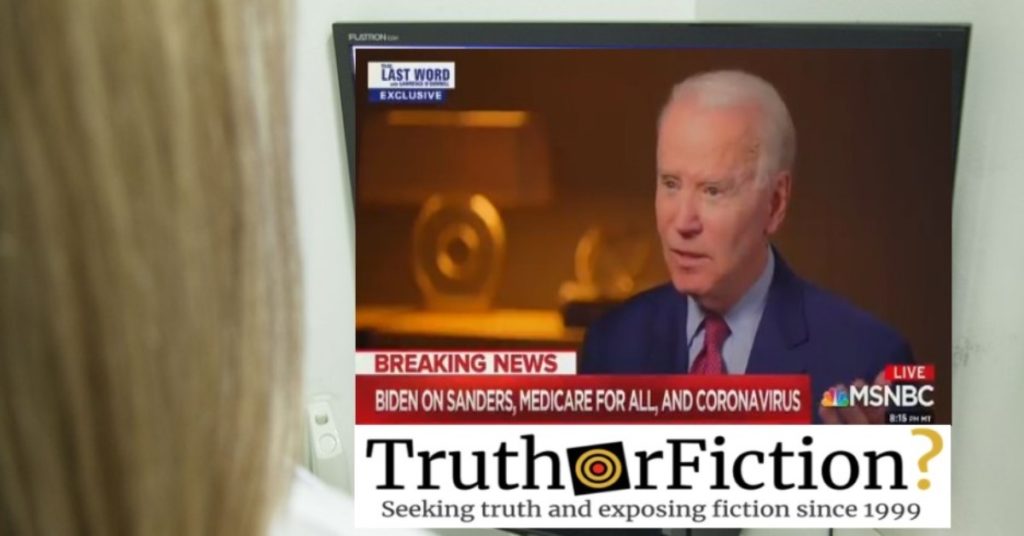Democratic presidential candidate Joe Biden was criticized in March 2020 following an interview with MSNBC host Lawrence O’Donnell as he faced accusations of intending to veto a bill expanding Medicare services for all Americans.
The exchange from the March 9 2020 interview is not available on MSNBC’s website. But the news site Talking Points Memo posted a clip of it:
Biden when asked if he would veto Medicare for All: “I would veto anything that delays providing the security and certainty of health care being available now.” pic.twitter.com/ov669grhmB
— Talking Points Memo (@TPM) March 10, 2020
While the clip shows that the former vice president did not literally say that he would veto a Medicare for All bill, he does make misgivings about that type of legislation plain to O’Donnell:
O’Donnell: I’ve asked other candidates this kind of question — [a] veto question. Let’s flash forward: you’re president. Bernie Sanders is still active in the Senate, he manages to get Medicare For All through the Senate in some compromised version — the Elizabeth Warren version, some other version. Nancy Pelosi gets a version of it through the House of Representatives. It comes to your desk, do you veto it?
Biden: I would veto anything that delays providing the security and the certainty of health care being available now. If they got that through by some miracle and there was an epiphany that occurred and some miracle occurred that said okay, it’s passed, then you gotta look at the cost. I want to know, how did they find the $35 trillion? What is that doing? Is it going to significantly raise taxes on the middle class, which it will. What’s gonna happen?
Look, my opposition isn’t to the principle that you should have Medicare. Health care should be a right in America. My opposition relates to whether or not A, it’s doable, two, what the cost is and the consequences for the rest of the budget are. How are you gonna find $35 trillion over the next 10 years without having a profound impact on everything from taxes for middle-class and working-class people as well as the impact on the rest of the budget?
Biden’s claim that enacting Medicare for All would cost $35 trillion over a ten-year period appears to be a reference to a study released in October 2019 by the social policy research group the Urban Institute, estimating the cost of that type of program at $34 trillion — $32 trillion after tax offsets — across that period of time. By comparison, a report released two months later by officials from the Centers for Medicare and Medicaid Services stated that health care spending for fiscal year 2018 was $3.6 trillion.
On his campaign website, Sanders — an independent campaigning against Biden for the Democratic presidential nomination — has listed listed several steps his administration would take to cover the cost of Medicare for All, including an increase on the marginal income tax rate to 52 percent on income above $10 million, as well as raising the federal corporate income tax rate to 35 percent. (The latter tax rate is at 21 percent as of March 2020.)
Sanders’ campaign cites a February 2020 study published in medical journal The Lancet, which also estimated the cost of enacting a universal health care program in the United States at $32 trillion over a ten-year period. The lead author of that report, Alison Galvani, is the Director of the Center for Infectious Disease Modeling and Analysis at the school of public health at Yale University. She also served as an “informal, unpaid advisor” to Sanders’ Senate office on the matter.
MSNBC has not posted the exchange between Biden and O’Donnell on its YouTube channel or its own page covering O’Donnell’s show, The Last Word. A section listing transcripts for the show has no episodes listed after February 24, 2020.

